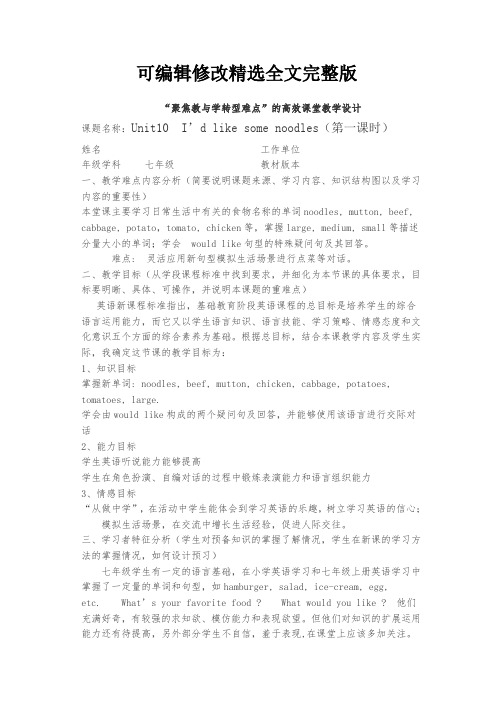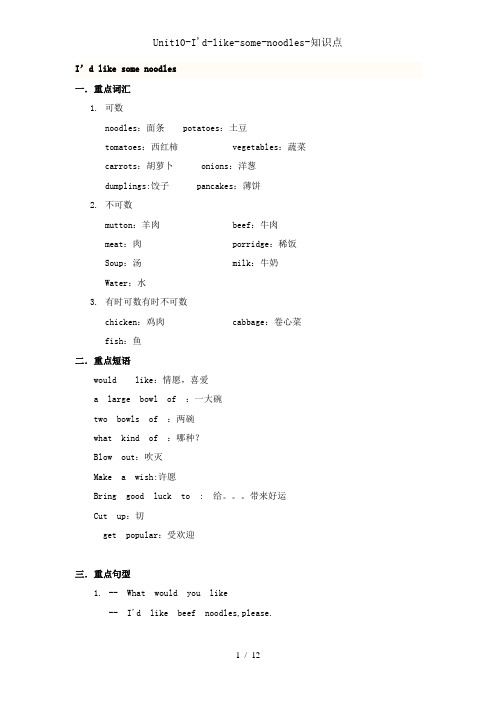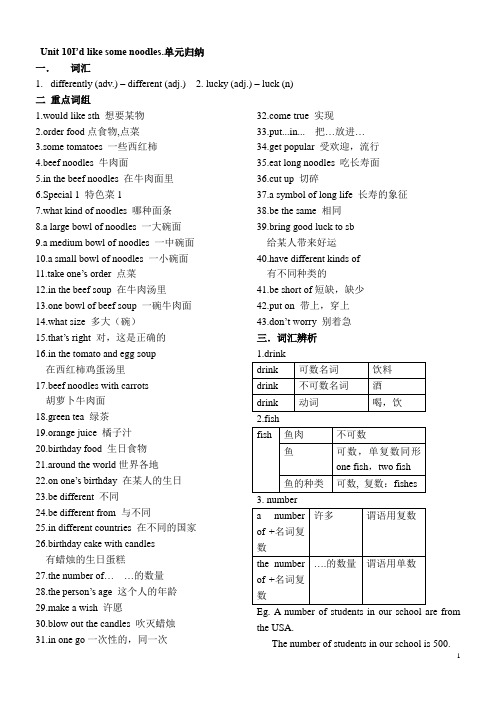七年级英语下册Unit10I’dlikesomenoodlesPart6SelfCheck同步练习新
Unit10-I’d-like-some-noodles教案精选全文完整版

可编辑修改精选全文完整版“聚焦教与学转型难点”的高效课堂教学设计课题名称:Unit10 I’d like some noodles(第一课时)姓名工作单位年级学科七年级教材版本一、教学难点内容分析(简要说明课题来源、学习内容、知识结构图以及学习内容的重要性)本堂课主要学习日常生活中有关的食物名称的单词noodles, mutton, beef, cabbage, potato,tomato, chicken等,掌握large, medium, small等描述分量大小的单词;学会would like句型的特殊疑问句及其回答。
难点:灵活应用新句型模拟生活场景进行点菜等对话。
二、教学目标(从学段课程标准中找到要求,并细化为本节课的具体要求,目标要明晰、具体、可操作,并说明本课题的重难点)英语新课程标准指出,基础教育阶段英语课程的总目标是培养学生的综合语言运用能力,而它又以学生语言知识、语言技能、学习策略、情感态度和文化意识五个方面的综合素养为基础。
根据总目标,结合本课教学内容及学生实际,我确定这节课的教学目标为:1、知识目标掌握新单词: noodles, beef, mutton, chicken, cabbage, potatoes, tomatoes, large.学会由would like构成的两个疑问句及回答,并能够使用该语言进行交际对话2、能力目标学生英语听说能力能够提高学生在角色扮演、自编对话的过程中锻炼表演能力和语言组织能力3、情感目标“从做中学”,在活动中学生能体会到学习英语的乐趣,树立学习英语的信心;模拟生活场景,在交流中增长生活经验,促进人际交往。
三、学习者特征分析(学生对预备知识的掌握了解情况,学生在新课的学习方法的掌握情况,如何设计预习)七年级学生有一定的语言基础,在小学英语学习和七年级上册英语学习中掌握了一定量的单词和句型,如hamburger, salad, ice-cream, egg,etc.What’s your favorite food ?What would you like ?他们充满好奇,有较强的求知欲、模仿能力和表现欲望。
初中英语人教版七年级下册Unit10 I’d like some noodles

Unit 10 I’d like some noodles.Section B 1a-1dTeaching Aims:1.Knowledge Objects:1) Students can master the words:dumpling , porridge, onion , fish, pancake2) Students can master the setences:I’d like some noodles.I like dumplings, fish and orange juice.I don't like onions, green tea or porridge.2.Ability Objects:1) Students listen and understand the conversation. They can fill up the blanks.2) Students can make conversations to express their likes and dislikes.3.Moral Object:Students can know the differences of healthy food and junk food, help them choose healthy food and keep a healthy diet.Teaching Emphasis:1. Students can master the words and sentences.2. Students listen and understand the conversation.3. Students can make conversations to express their likes and dislikes. Teaching Aids:PPT, tape recorderTeaching procedures:Ⅰ. Warm-up1.Let’s chant!What would you like? What would you like?Noodles, noodles. I’d like noodles.What kind of noodles? What kind of noodles?Beef and potato, beef and potato.What size bowl of noodles? What size bowl of noodles?A large bowl of noodles. A large bowl of noodles.A large bowl of beef and potato noodles.2.Memory GameMake a sentence: I’d like ... noodles.beefbeef potatobeef potato cabbagebeef potato cabbage muttonbeef potato cabbage mutton tomatobeef potato cabbage mutton tomato fishⅡ. Presentation1.Show some pictures of food on the screen.Review some words of fruits, vegetables and meat.Present some new words and expressions to the Ss.2. Ss learn the new words and expressions by themselves and try toremember them.3. Work on 1a:Read the words in the chart and look at the pictures below. Write the letters of the foods or drinks on the line. Then check the answers.4. Let Ss read the words together, try to remember the new words and expressions.Ⅲ. Practice1. Circle the things you like in 1a. Put an х next to the things you don’tlike .Then tell you partner what you like and don't like.Sa: I like dumplings, but I don't like noodles.Sb: Well, I like fish but I don't like meat.2. Work in groups. Talk about what you like and what you don’t like.3. Make a list of things every one likes and dislikes in your group. Thengive a report to your classmates:In our group, Sa likes dumplings but she doesn't like noodles. Sb likes fish but she doesn't like meat. …4. Let some Ss give their report.Ⅳ. ListeningWork on 1c:1. Ask Ss to read the ORDER FORM carefully.2. Play the tape for the Ss to listen and complete the food order form.(Play the recording for the first time, students only listen carefully.Then, listen to the recording again, and write down the names of thefoods. )Work on 1d:Listen again. Use the pause button to check the answers with the Ss. V. DiscussionWhich do you think is healthy food?Which is junk food (垃圾食品)?VI. ExerciseFill in the blanks.1. What kind of __________ (饺子) would you like?2. I’d like two small orange ______ (果汁).3. My grandmother has ________(粥) for breakfast every morning.4. How many ________(洋葱) do we need?5. Do you like _____ (鱼肉) or not?6. I like beef, mutton and ice cream. (改为否定句)I ______ ______ beef, mutton _____ ice cream.7. Jim would like a pizza with beef on it. (对划线部分提问)_______ ______ ____ pizza would Jim like?Translate and write them down.1. 你喜欢哪种食物?2. 我喜欢饺子,鱼肉和橘汁。
Unit10-I'd-like-some-noodles-知识点1

I’d like some noodles一.重点词汇1.可数noodles:面条potatoes:土豆tomatoes:西红柿vegetables:蔬菜carrots:胡萝卜onions:洋葱dumplings:饺子pancakes:薄饼2.不可数mutton:羊肉beef:牛肉meat:肉porridge:稀饭Soup:汤milk:牛奶Water:水3.有时可数有时不可数chicken:鸡肉cabbage:卷心菜fish:鱼二.重点短语would like:情愿,喜爱a large bowl of :一大碗two bowls of :两碗what kind of :哪种?Blow out:吹灭Make a wish:许愿Bring good luck to : 给。
带来好运Cut up:切get popular:受欢迎三.重点句型1.-- What would you like-- I'd like beef noodles,please.2.--What kind of noodles would you like-- I'd like the beef noodles, please.3.May I take your order 我能拿走你的菜单吗?4.--What size would you like 你想要多大的?--I’d like a large bowl, please.5.--Is there any meet in the tomato and egg soupNo, there isn’t any.四.重点知识1、Would like的用法2.1would like 意为想要,情愿,相当于want,用于提出要求或建议;但语气比want委婉,一般有一下三种形式:①would like sth. 想要某物后接名词不加to如:我想要些冰淇淋I would like some ice cream.②would like to do sth. 想要干某事后跟动词,加to如:我想要和你一起去。
英语人教版七年级下册unit10 I'd like some noodle

Unit 10 I’d like some noodles.Period 1 Content Section A1a, 1b, 1c,教学目标要求1.能够使用What would you like? 和I’d like ... 句型来询问和回答对食物的喜好,完成在饭店中的点餐活动,如:What would you like?I’d like beef noodles.2.能够使用情态动词would,如:What would you like? I’d like ...3.能够使用there be 句型的一般疑问形式来询问食物中的材料,并作简单回答,如:Is there any cabbage in the noodles? No, there isn’t any. / No, there’s no cabbage. Are there any vegetables in the noodl es? Yes, there are sometomatoes.4.能够听懂和学5.能在教师指导下理解可数名词和不可数名词的区别和用法,如:counta ble nouns: tomatoes,potatoes, noodles, carrots;uncountable nouns: beef, meat,beef等。
6.能认读并能工整书写所学单词和短语,如:noodle, cabbage, potato, carrot, meat,would like, come with等。
7.能模仿录音正确朗读和表演教材上的对话并能模仿目标语的结构和语调进行初步表达(会话),如:What would you like? I’d like beef noodl es. Is there any cabbage in the noodles? No, there isn’t any. / No, there’s no cabbage.教学过程活动步骤教与学活动目的及其操作教学资源运用3 m 复习已学目标语和教师指着一些有关食物的图片,与学生进行对话。
7下unit10_I'd_like_some_noodles单元归纳

Unit 10I’d like some noodles.单元归纳一.词汇1.differently (adv.) – different (adj.)2. lucky (adj.) – luck (n) 二重点词组1.would like sth 想要某物2.order food点食物,点菜3.some tomatoes 一些西红柿4.beef noodles 牛肉面5.in the beef noodles 在牛肉面里6.Special 1 特色菜17.what kind of noodles 哪种面条8.a large bowl of noodles 一大碗面9.a medium bowl of noodles 一中碗面10.a small bowl of noodles 一小碗面11.take one‟s order点菜12.in the beef soup 在牛肉汤里13.one bowl of beef soup 一碗牛肉面14.what size 多大(碗)15.that‟s right对,这是正确的16.in the tomato and egg soup在西红柿鸡蛋汤里17.beef noodles with carrots胡萝卜牛肉面18.green tea 绿茶19.orange juice 橘子汁20.birthday food 生日食物21.around the world世界各地22.on one‟s birthday在某人的生日23.be different 不同24.be different from 与不同25.in different countries 在不同的国家26.birthday cake with candles有蜡烛的生日蛋糕27.the number of… …的数量28.the person‟s age这个人的年龄29.make a wish 许愿30.blow out the candles 吹灭蜡烛31.in one go一次性的,同一次e true 实现33.put...in... 把…放进…34.get popular 受欢迎,流行35.eat long noodles 吃长寿面36.cut up 切碎37.a symbol of long life 长寿的象征38.be the same 相同39.bring good luck to sb给某人带来好运40.have different kinds of有不同种类的41.be short of短缺,缺少42.put on 带上,穿上43.don‟t worry别着急三.词汇辨析1.drink2.fish3. numberEg. A number of students in our school are from the USA.The number of students in our school is 500.4.want / would like = …d like四.重点句型。
七年级英语下册《Unit10_I’d_like_some_noodles_教新目标版整1单元

I’d like pork and cabbage noodles.
I’d like egg and tomato noodles.
1a. Match the words with the foods. g 1. mutton _____
2. beef _____ b
c 3. noodles _____
3a. Complete the conversation below.
1. May I have your order?___ D 2. What kind of noodles A would you like?____ 3. We have beef, chicken, mutton, cabbage, potato, tomato…____ F 4. Yes, there are some C carrots.___ 5. Sure. What size would E you like?____ 6. We have large, medium B and small bowls.____ A: What kind of noodles do you have? B: Oh, a medium bowl, please. C: OK, I’d like the mutton noodles then. D: I’d like some noodles, please. E: What sizes do you have? F: Are there any vegetables in the mutton noodles?
可修饰可数名词复数或不可数名词,常 用于疑问句和否定句。如:
I can’t see any tea. 我没看见茶叶。 Do you have any friends at school? 你在学校有些朋友吗?
七年级英语下册《Unit10 I’d like some noodles Self check》课件 (新版)人教新目标版

10.The noodles with orange juice ________ A only $1.5. A. is B. are C. for D. with 11.What size bowl of dumplings would C you like, small, medium, ______ large? A. and B. with C. or D. but C 12. He usually _______ breakfast at home. A. eat B. have C. has D. eats
(蜘蛛) on your bread will soon get him.
There are 2. Customer:__________ two flies in my fish soup. Waiter: I don’t know. But we are short of fish. 3. Customer: We ordered mutton noodles, but _________ any mutton in the noodles. there isn’t Waiters: Put on your glasses and you can see the mutton.
M
收集英语广告词
(可能的话自己试着设计一份)
Just do it. 只管去做。(耐克运动鞋) The taste is great. 味道好极了。(雀巢咖啡) Poetry in motion, dancing close to me. 动态的诗, 向我舞近。(丰田汽车) Good to the last drop. 滴滴香浓, 意犹未尽。 (麦斯威尔咖啡) Impossible made possible. 使不可能变为可能。(佳能打印机) Let’s make things better. 让我们做得更好。(飞利浦电子)
- 1、下载文档前请自行甄别文档内容的完整性,平台不提供额外的编辑、内容补充、找答案等附加服务。
- 2、"仅部分预览"的文档,不可在线预览部分如存在完整性等问题,可反馈申请退款(可完整预览的文档不适用该条件!)。
- 3、如文档侵犯您的权益,请联系客服反馈,我们会尽快为您处理(人工客服工作时间:9:00-18:30)。
Unit 10 I’d like some noodlesPart 6 Self Check——自我检测,综合提升一、读音标,写单词。
1./ˈɑːnsə/ /pəˈteɪtəʊ/ /ˈdʌmplɪŋ/answer potato dumpling2./ˈlɑːdʒ/ /ˈnuːd(ə)l/ /ˈdɪfərənt/large noodle different3./biːf/ /ˈɔːdə/ /ˈpænkeɪk/beef order pancake4./eɪdʒ/ /ˈspeʃəl/ /ˈkændl/age special candle5./aɪˈdɪə/ /ˈkændi//ˈpɒpjʊlə/idea candy popular二、单元语法过关。
( C )1.If he _________ hard, he _________ well.A.studies; studies B.will study; willstudyC.studies; will study D.will study; studies( B )2.Mike c an’t g o t o t he p ark w ith h is f riends_________ h e h as t o l ook a fterher baby sister.A.if B.because C.so D.but( D )3.There ________ a lot of tomatoes on his uncle’s farm.A.has B.have C.is D.are ( C )4.My brother wants to be a basketball player. I think his dream will__________.A.come out B.get out C.come true D.get true( A )5.Eating noodles __________ our birthday is a symbol of long life.A.on B.at C.in D.to ( B )6.The air is very fresh, because there are ___________ trees around.A.the number of B.a number of C.not many D.much( C )7.I a m __________ m y b rother. H e l ikes p laying s ports, b ut I l ike r eading.A.like B.the same asC.different from D.popular with( D )8.Tom is a _________ boy in our class, he hates doing homework.A.popular B.beautiful C.hard-working D.lazy( B )9.He never talks with his mother _________ father at home. So his parentsare worried about him.A.and B.or C.so D.but ( A )10.I w ill _________ t he b ig p iece o f p aper a nd g ive y ou s ome s mall p ieces.A.cut up B.cut in C.blow out D.blow down三、配对阅读专练。
左栏是对五个人的情况介绍,右栏是七个建议,请将这五个人的情况与建议配对,并将答案的字母编号填写在题前括号内。
( E )1.Mary is a middle school student. She A.Eating lots of junk food is bad for us. We likes eating meat. She never eats shouldn’t eat too much of it in a week.vegetables. B.Breakfast is very important to us, so ( F )2.Mr. Green is getting fat, but he is everyone s hould e at b reakfast i n t he m orning.very busy every day. He has no time You can take some bread with you if you haveto take exercise. He often feels to rush.tired and can’t sleep well. C.We should go to bed early so that we can get( A )3.Jim eats hamburgers and French fries up early in the morning.five times a week. His mother is D.Sweet food makes people get fat easily andworried about him. it’s bad for our teeth.( B )4.Lisa g ets u p l ate e very m orning, s o s he E.We can’t eat too much meat in every meal and can’t e at b reakfast. S he o ften f eels we should eat some vegetables.hungry at school. F.No matter how busy we are, we should play ( D )5.Mrs. White eats lots of ice-cream sports every day to keep healthy. Doing and pancakes because she likes sweet sports can help us keep healthy.food. G.If y ou w ant t o b e h ealthy, d on’t e at t oo m ucha day.四、短文填空。
Joe is an 8-year-old boy. He has a 1 named Paul. Joe likes Paul very much. Every afternoon, Joe takes Paul for a walk near his house. Today, Joe is verybusy. He 2 to go to Linda’s birthday party. So Joe 3 a small hamburgerto Paul and asks him to play with other dogs.Paul has the hamburger 4 his mouth. Then he goes to Ann’s house. Ann is a w hite d og. P aul likes A nn very much. H e w ants to eat the hamburger 5 Ann.Ann’s house is on the 6 side of the river. 7 is a bridge over it. WhenPaul goes along it, he has a look at the river. He finds a black dog in the river.And there is a hamburger in his 8 , too.“9 hamburger is bigger than my hamburger,” Paul thinks. “I must get it. Then I’ll eat the big hamburger and ask Ann to eat the 10 one.” ThenPaul opens his mouth. And you know what happens.1.dog 2.needs/has 3.gives 4.in5.with6.other 7.There 8.mouth 9.His 10.small五、读写综合。
A.信息归纳。
New Year is an important festival around the world. Do you know how people celebrate New Year in different countries? Here are some examples. In Russia, thereis lots of food on the table, so the next year will be happy and rich. At 11:59,all the people open wine and wait for the first sound of twelve o’clock.Then theymake a t oast(祝酒)for t he N ew Y ear. T hey w ish e verybody g ood h ealth a nd h appiness.In Spain, people eat twelve grapes—one with each sound of the clock at night.This brings good luck for the next twelve months. But it is difficult to eat twelvegrapes in twelve seconds, so people usually have a mouth full of grapes at last.In China, people always eat eight, ten or twelve dishes at New Year. Do you know why? That is because numbers like 2, 4, 6 and so on mean double the luck. A lot offood has a special meaning. For example, long noodles mean long life. People don’tuse knives to cut things, because this means the end of your good luck.Different countries have different ways to celebrate New Year. I think they are very interesting.Information CardThe country where people make a toast or NewYear at 12:00 p.m.1.Russia.The number of grapes people have in their mouth for the sound of 12:00 p.m. in Spain 2.Twelve. 3.Long life.The meaning of long noodles in ChinaThe reason why people in China don’t use 4.Because it means the end of good luck. knives on New Year’s DayThe main idea of the passage 5.How people celebrate New Year in different countries.B.书面表达。
